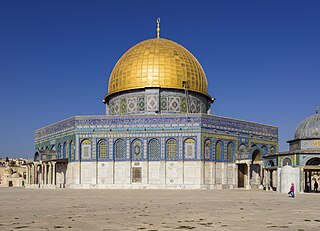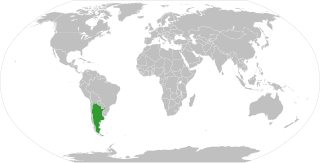
The history of the State of Palestine describes the creation and evolution of the State of Palestine in the West Bank and Gaza Strip. During the Mandatory period, numerous plans of partition of Palestine were proposed but without the agreement of all parties. In 1947, the United Nations Partition Plan for Palestine was voted for. The leaders of the Jewish Agency for Palestine accepted parts of the plan, while Arab leaders refused it. This triggered the 1947–1949 Palestine war and led, in 1948, to the establishment of the state of Israel on a part of Mandate Palestine as the Mandate came to an end.

Palestine, officially the State of Palestine, is a country in the southern Levant region of West Asia. It encompasses two disconnected territories — the West Bank and the Gaza Strip, collectively known as the Palestinian territories — within the larger region of Palestine. The country shares its borders with Israel to north, west and south, Jordan to the east and Egypt to the southwest. It has a combined land area of 6,020 square kilometres (2,320 sq mi) while its population exceeds five million people. Its proclaimed capital is Jerusalem while Ramallah serves as its administrative center and Rafah is currently its largest city. Arabic is the official language. The majority of Palestinians practice Islam while Christianity also has a significant presence.
Issues relating to the State of Israel and aspects of the Arab–Israeli conflict and more recently the Iran–Israel conflict occupy repeated annual debate times, resolutions and resources at the United Nations. Since its founding in 1948, the United Nations Security Council, has adopted 79 resolutions directly related to the Arab–Israeli conflict as of January 2010.
The United Nations General Assembly has granted observer status to international organizations, entities, and non-member states, to enable them to participate in the work of the United Nations General Assembly, though with limitations. The General Assembly determines the privileges it will grant to each observer, beyond those laid down in a 1986 Conference on treaties between states and international organizations. Exceptionally, the European Union (EU) was in 2011 granted the right to speak in debates, to submit proposals and amendments, the right of reply, to raise points of order and to circulate documents, etc. As of May 2011, the EU is the only international organization to hold these enhanced rights, which has been likened to the rights of full membership, short of the right to vote.
The politics of the Palestinian National Authority (PNA) take place within the framework of a semi-presidential multi-party republic, with a legislative council, an executive president, and a prime minister leading the cabinet.
Issues relating to the State of Palestine and aspects of the Israeli–Palestinian conflict occupy continuous debates, resolutions, and resources at the United Nations. Since its founding in 1948, the United Nations Security Council, as of January 2010, has adopted 79 resolutions directly related to the Arab–Israeli conflict.

China–Palestine relations, also referred to as Sino–Palestinian relations, encompass the long bilateral relationship between China and Palestine dating back from the early years of the Cold War.

The Palestinian–Serbian relations are bilateral relations between the State of Palestine and the Republic of Serbia. Relations between Serbia and Palestine have been very close and friendly.

Palestine 194 is an ongoing diplomatic campaign by the Palestinian National Authority to gain membership in the United Nations for the State of Palestine. The name of the campaign is a reference to Palestine becoming the 194th member of the UN. The UN campaign is part of a strategy to gain international recognition of the State of Palestine, based on the borders prior to the Six-Day War, with East Jerusalem as its capital. The initiative developed during a two-year impasse in negotiations with Israel that followed the latter's refusal to freeze its settlement activities in the West Bank. The campaign was reported in the media as early as late 2009, and gained prominence during the leadup to the 66th Session of the General Assembly in September 2011. Palestinian President Mahmoud Abbas submitted the application to the Secretary-General Ban Ki-moon on 23 September 2011, which the Security Council has yet to vote on.
United Nations General Assembly resolution 67/19 is a resolution upgrading Palestine to non-member observer state status in the United Nations General Assembly. It was adopted by the sixty-seventh session of the United Nations General Assembly on 29 November 2012, the date of the International Day of Solidarity with the Palestinian People and the 65th anniversary of the adoption by the General Assembly of resolution 181(II) on the Future Government of Palestine. The draft resolution was proposed by Palestine's representative at the United Nations. It, however, maintains the status of the Palestinian Liberation Organization as the representative of the Palestinian people within the United Nations system. Though strongly contested by the United States and the government of Israel, former Israeli Prime Minister Ehud Olmert expressed support for the measure. The motion was seen as largely symbolic, though it could allow Palestine to start proceedings at the International Criminal Court against Israel. Its timing, following a year in which Palestine obtained membership of UNESCO and the UN Security Council was unable "to make a unanimous recommendation" on their application for full UN membership, and coming several days after the completion of Operation Pillar of Defense, was also noted. The new status equates Palestine with that of the Holy See within the United Nations system and implicitly recognises Palestinian sovereignty.

The foreign relations of the State of Palestine have been conducted since the establishment of the Palestine Liberation Organization (PLO) in 1964. Since the Oslo Accords, it seeks to obtain universal recognition for the State of Palestine on the 1967 borders, with East Jerusalem as its capital. As of 4 April 2024, 140 of the 193 United Nations (UN) member states officially recognize the State of Palestine.

The Palestinian Declaration of Independence formally established the State of Palestine, and was written by Palestinian poet Mahmoud Darwish and proclaimed by Yasser Arafat on 15 November 1988 in Algiers, Algeria. It had previously been adopted by the Palestinian National Council (PNC), the legislative body of the Palestine Liberation Organization (PLO), by a vote of 253 in favour, 46 against, and 10 abstaining. It was read at the closing session of the 19th PNC to a standing ovation. Upon completing the reading of the declaration, Arafat, as Chairman of the PLO, assumed the title of President of Palestine. In April 1989, the PLO Central Council elected Arafat as the first President of the State of Palestine.

As of May 2024, the State of Palestine is recognized as a sovereign state by 143 of the 193 member states of the United Nations. It has been a non-member observer state of the United Nations General Assembly since November 2012.

The two-state solution to the Israeli–Palestinian conflict proposes to resolve the conflict by establishing two nation states in former Mandatory Palestine. The implementation of a two-state solution would involve the establishment of an independent State of Palestine alongside the State of Israel.
There are a wide variety of views regarding the legal status of the State of Palestine, both among the states of the international community and among legal scholars. The existence of a state of Palestine, although controversial, is a reality in the opinions of the states that have established bilateral diplomatic relations. It is a non-member observer state at the United Nations since November 2012. As of 4 April 2024, a total of 140 countries recognize it.

United Nations General Assembly Resolution ES‑10/19 is an emergency session resolution declaring the status of Jerusalem as Israel's capital as "null and void". It was adopted by the 37th Plenary meeting of the tenth emergency special session of the United Nations General Assembly during the tenure of the seventy-second session of the United Nations General Assembly on 21 December 2017. The resolution was drafted by Yemen and Turkey. Though strongly contested by the United States, it passed by 128 votes to 9 against with 21 absentees and 35 abstentions.

Palestine–Spain relations are the bilateral and diplomatic relations between these two countries. Palestine has an embassy in Madrid. Spain has a consulate general in East Jerusalem that serves the West Bank, Gaza and Jerusalem. Spain currently does not recognise the state of Palestine, but has pledge to recognise Palestinian statehood by 28 May 2024.

Diplomatic relations between Argentina and Palestine have existed since 1982. There is a small Palestinian community in Argentina as part of the larger Arab community. On 6 December 2010, the government of Argentina officially recognized the State of Palestine as "free and independent", "within the borders existing in 1967. A Palestinian embassy was opened on 15 November 1999.
The Israel–Hamas war sparked a major diplomatic crisis, with many countries around the world reacting strongly to the conflict that affected the momentum of regional relations. At least nine countries took the drastic step of recalling their ambassadors and cutting diplomatic ties with Israel. The conflict has also resulted in a renewed focus on a two-state solution to the ongoing conflict.

United Nations General Assembly Resolution ES-10/22 is a resolution of the tenth emergency special session of the United Nations General Assembly calling for an immediate ceasefire in the Israel–Hamas war, "immediate and unconditional" hostage release, "ensuring humanitarian access" and that "all parties comply with their obligations under international law".













